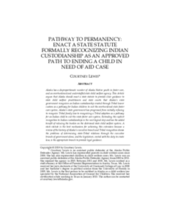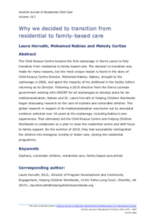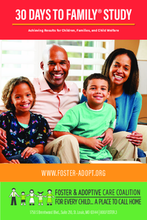Displaying 181 - 190 of 579
This short human rights in action article takes a critical approach to the translation of policy to practice and highlights risks involved with haste, outcomes measured in numbers and unrealistic timeframes, and rapidly transforming practice with nascent investment in a country’s capacity to assess and respond to the real needs of children and families within their communities.
The aims of this study were to systematically evaluate and comparatively analyse the mental health status of left‐behind children (LBC) in China and to provide a scientific basis for mental intervention and healthy education for LBC.
The objective of this paper is to examine the situation of orphans and vulnerable children (OVC) in Dar es Salaam, Tanzania in existing alternative care systems and explore the treatment of OVC in these systems.
This article argues that the US state of Alaska should enact a state statute to provide clear guidance to state child welfare practitioners and state courts that Alaska’s state government recognizes an Indian custodianship created through Tribal law or custom as a pathway for Indian children to exit the overburdened state foster care system.
This paper from the Scottish Journal of Residential Child Care outlines the Child Rescue Centre's process of transitioning from residential care to family-based care in Sierra Leone.
This article tracks the history of foster care licensing requirements in the U.S. state of Minnesota, discusses the real-life story of a grandmother with a grandchild placed in foster care, explains the federal mandates established through the Adam Walsh Act, discusses the existing flaws in the process, and highlights the ways in which Minnesota’s current statutory scheme and processes disproportionally impact communities of color.
This brief from the Foster & Adoptive Care Coalition in the United States provides an overview of the 30 Days to Family® program in the U.S. state of Missouri, an intense, short-term intervention developed by the Foster & Adoptive Care Coalition to: 1) increase the number of children placed with relatives/kin at the time they enter the foster care system; and 2) ensure natural and community supports are in place to promote stability for the child.
This article reports a research study in Victoria, Australia, that explored nonfamilial kinship care through analysis of administrative data, interviews with young people and carers, and focus groups with kinship care support workers.
This study investigates the difference in the well-being of children in kinship care when compared to children in other care settings within Africa, examining factors that are associated with their well-being outcomes.
This chapter from the Handbook of Parenting and Child Development Across the Lifespan explores five domains of research connecting social support and parenting: (1) intergenerational transmission of parenting; (2) community and neighborhood; (3) marriage quality; (4) grandmothers; and (5) offline and online friends.




